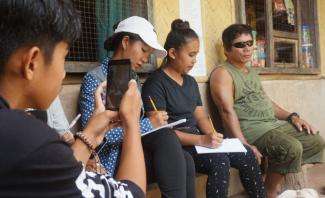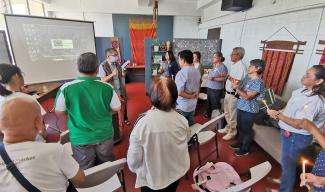The indigenous Tagbanwa of Calawit Island in Calamianes, Palawan suffered from harassment and forcible removal from their ancestral domains in the 1970’s during martial law in the Philippines. They were stripped off of their right to manage their territory and to benefit from its bounty. Because of their relocation, the community gradually changed their daily way of life to adapt to the environment different from what they were used to. The indigenous Tagbanwa culture was also slowly erased from the memory of the mamepet or elders.
The people of Calawit Island are now rightfully back in the territory that is their inheritance and they are managing their ancestral domain and ancestral waters. The mamepet, however, fear the total loss of their culture and their identity as Tagbanwa people. Hence, joining forces with other Tagbanwa communities of Panlaitan, San Isidro, and Coron Islands, they embarked on the mission of remembering their culture, embodied in their indigenous knowledge systems and practices (IKSP).
The documentation process was assisted by the Saragpunta Federation of Tagbanwas (SARAGPUNTA), the Philippine Women’s University (PWU), and Samdhana Institute for the purposes of providing reference materials about the Tagbanwa culture and eventually passing this on to the next generations.
Initiatives such as documentation related to culture, usually does not involve the youth sector. Engaging the youth spark an interest, ignite their passion exploring their culture from the elders. This had made the elders realized the importance of teaching their culture to the next generations in the same way their forefathers taught them.
The Calamian Tagbanwa have an oral culture where information can get lost in translation. Tapping into current mediums for documentation and transfer, such as written form, and audio and video recordings, provide more accurate information than word of mouth. Initial documentation by the youth included indigenous songs, dances, musical instruments, boat-making, signs in nature, and navigation. The IKSP documentation continues with the community, as they race against time and modern influences to keep Calamian Tagbanwa culture alive with the next generation.###




